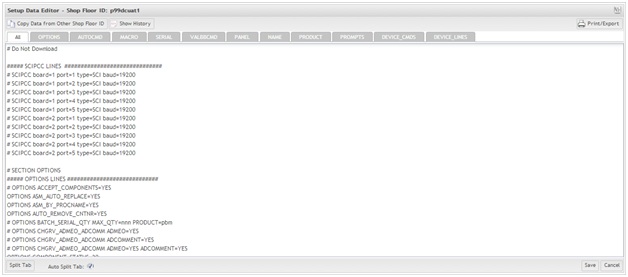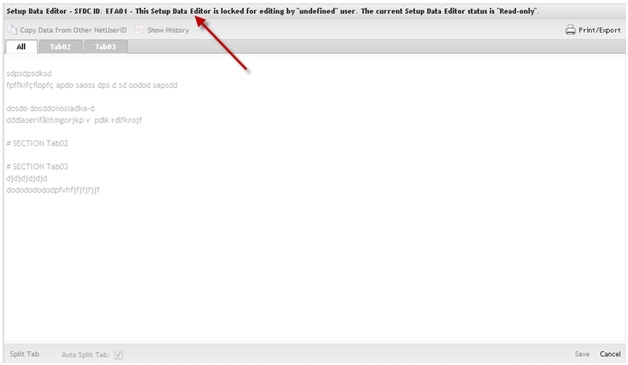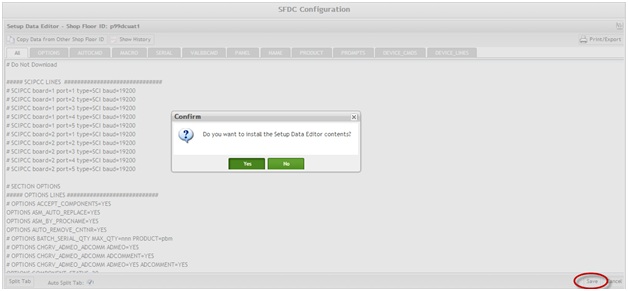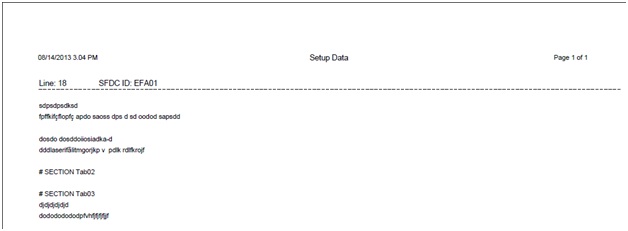Difference between revisions of "SOP-42Q-MES0005 Data Editor Maintenance"
| Line 61: | Line 61: | ||
=== Editing with the Setup Data Editor === | === Editing with the Setup Data Editor === | ||
| − | This | + | This module enables the user to edit using the Setup Data Editor. |
1. To edit using Setup Data Editor, select the data editor to be edited and select '''Edit'''. The Setup Data Editor Form for the selected Shop Floor ID is now displayed. | 1. To edit using Setup Data Editor, select the data editor to be edited and select '''Edit'''. The Setup Data Editor Form for the selected Shop Floor ID is now displayed. | ||
| Line 89: | Line 89: | ||
==== Copy Setup Data Editor from Other Shop Floor ID ==== | ==== Copy Setup Data Editor from Other Shop Floor ID ==== | ||
| − | This | + | This module replaces the contents of the current Setup Data Editor Form with data copied from another Shop Floor ID. |
1. To copy data from another Shop Floor ID, open the target Shop Floor ID<nowiki>’</nowiki>s Setup Data Editor and select '''Copy Data from Other Shop Floor ID''' in the Tasks window. The Choose a Shop Floor ID window is now displayed. | 1. To copy data from another Shop Floor ID, open the target Shop Floor ID<nowiki>’</nowiki>s Setup Data Editor and select '''Copy Data from Other Shop Floor ID''' in the Tasks window. The Choose a Shop Floor ID window is now displayed. | ||
| Line 133: | Line 133: | ||
==== Print/Export Current Setup Data Editor ==== | ==== Print/Export Current Setup Data Editor ==== | ||
| − | This | + | This module enables the user to print or export the current Setup Data Editor. |
1. To print or export current Setup Data Editor Form, select '''Print/Export'''. A report PDF will be generated that the user may save or print. | 1. To print or export current Setup Data Editor Form, select '''Print/Export'''. A report PDF will be generated that the user may save or print. | ||
| Line 157: | Line 157: | ||
==== Show History ==== | ==== Show History ==== | ||
| − | This | + | This module displays the Setup Data Editor history updates. |
1. To show the history, select '''Show History'''. The '''Setup Data Backup Files''' pop-up is now displayed. | 1. To show the history, select '''Show History'''. The '''Setup Data Backup Files''' pop-up is now displayed. | ||
Revision as of 13:51, 21 July 2017
42Q Home > Shop Floor Control > Configuration > Data Editor Maintenance
This edition applies to MES15 portal V1.0 and all subsequent releases and modifications until otherwise indicated in new revisions.
Contents
SFDC Configuration
42Q’s powerful data collection system collects critical information from a plant’s shop floor, utilizing shop floor data collector, an intuitive tool developed by 42Q’s experienced manufacturing team. The aggregate information is stored in a cloud database, and available to MESWeb, where quality reports are generated. The 42Q system uses manual and automated barcode scanning to collect data for a product line or plant. Thus, 42Q plays an important role in maintaining unit histories and directing product movement on the manufacturing floor. The current version of 42Q includes configuration capabilities, which provide access to all sub-modules pages and their functionalities (view, add, edit, print/generate output files).
To access SFDC Configuration, navigate to Shop Floor Control > Configuration > SFDC Configuration. The main SFDC Configuration page is displayed:
Figure 1: MES Portal – SFDC Configuration Sub-modules
NOTE: A user only has access to the modules assigned to his/her profile.
Data Editor Maintenance
Data Editor Maintenance provides access to the SFDC configuration file that defines (but is not limited to) PCC ports, Options Lines, Auto Commands, Macros, Serial Input Masking, Passwords, and Device Numbers.
To access the Data Editor, select Data Editor in the SFDC Configuration main menu.
The Setup Data Editor screen is displayed.
Figure 2: Setup Data Editor Shop Floor ID List
The user is able to edit, clear Data Editor, and print/export the data.
Filter Setup Data Editor by SFDC ID
This module enables the user to filter by SFDC ID.
1. Enter the desired SFDC ID into appropriate field, and then select Filter. The filtered Shop Floor ID is now displayed.
Figure 3: Shop Floor ID List - Find

Editing with the Setup Data Editor
This module enables the user to edit using the Setup Data Editor.
1. To edit using Setup Data Editor, select the data editor to be edited and select Edit. The Setup Data Editor Form for the selected Shop Floor ID is now displayed.
Figure 4: Shop Floor ID List – Edit Setup Data Editor
Figure 5: Setup Data Editor Form
NOTE: To add a new tab, create an entry line by entering "# SECTION" + section name.
For example: # SECTION MULTIPASS
2. Enter the desired modifications to the Setup Data Editor Form.
NOTE: If multiple users have opened the Setup Data Editor for the same SFDC PC line, only the first user to open the file has write access. Other users are notified that the SDE is locked for editing by another user and that read-only access is allowed.
Copy Setup Data Editor from Other Shop Floor ID
This module replaces the contents of the current Setup Data Editor Form with data copied from another Shop Floor ID.
1. To copy data from another Shop Floor ID, open the target Shop Floor ID’s Setup Data Editor and select Copy Data from Other Shop Floor ID in the Tasks window. The Choose a Shop Floor ID window is now displayed.
Figure 7: Copy Data from Other Shop Floor ID
Figure 7 Copy Data from Other Shop Floor ID.jpg
2. Select the Shop Floor ID to copy and select Save to install the Setup Data Editor. The Setup Data Editor is now updated with the data from the selected Shop Floor ID.
3. Select Yes to confirm the install, or select No to cancel.
NOTE: The application saves a backup file on the MES server every time user installs a Setup Data Editor.
Publish History
The Publish History functionality is used by permitted users to show and publish the action history of a Route. To use this functionality
- Select a route from the list. The Publish History function becomes available for selection.
- Select Publish History. The Publish History window pops up for the given route. This history shows the Action, Status, Time/Date, and User for each item.
- Select Publish, to publish the history to Conduit. Select Close to end or abort.
Figure 9: Publish History
Print/Export Current Setup Data Editor
This module enables the user to print or export the current Setup Data Editor.
1. To print or export current Setup Data Editor Form, select Print/Export. A report PDF will be generated that the user may save or print.
Figure 10: Print/Export Current Editor
Figure 11: Print/Export Report
Show History
This module displays the Setup Data Editor history updates.
1. To show the history, select Show History. The Setup Data Backup Files pop-up is now displayed.
Figure 12: Show History
FIgure 11 Show History.jpg
2. Select the Restore Setup Data icon to restore the data or to save it locally, then select Download Setup Data icon.
Save/Publish
The Save/Publish Conduit-based function at the bottom of the Attribute Step List screen is available to users with the appropriate permissions and can be used by selecting the down arrow adjacent to the Save button. Whereas Save gives the record a pending status relative to Conduit, Save/Publish saves the record and publishes it to Conduit.
Figure 13: Save/Publish - Conduit Function
Appendix A
| COPS Customer Order Processing System |
Appendix B
Glossary
Access Control
A module that will set the permissions for users and external customers of 42Q
Administrator
the System Administrator has full access - all plants, all reports, all users.
Component
A component is a specific piece of data that appears on a label, for example: bar code, part numbers, graphic images, line or text. Hence, label components are broken down into several different types: text, graphic images, MDS database values, or a combination of text and database values.
Framework
In software development, a framework is a defined support structure in which another software project can be organized and developed. A framework may include support programs, code libraries, a scripting language, or other software to help develop and glue together the different components of a software project.
SFDC Configuration
The rules used to define how SFDC collects data, provides analysis, controls processing and maintains unit histories
Site Minder
Universal login of 42Q
Username
The username is the siteminder username (or a partial string)
Document Revision History
| Date | Author | Title | Version | Change Reference | Approved by |
| 08/14/13 | Elaine Fonaro | Technical Writer | v 1.0 | This is the first revision of MDS User’s Guide | |
| 03/17/14 | Ashley Martin | Technical Writer | v 1.0 | Review and added the new function Map Defect X Process | |
| 03/17/14 | Elaine Fonaro | Technical Writer | v 1.0 | Review and format for WIKI | |
| 04/3/17 | Martha Jordan | Technical Writer | v 1.0 | Rewrite SFDC introductory paragraph according to current 42Q functionality | Bob Moss |









